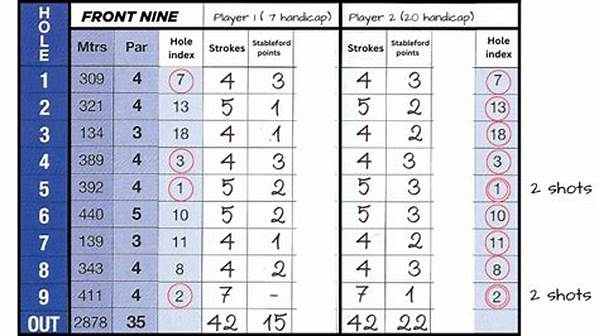Hey there, fellow golf enthusiasts! Whether you’re someone who spends weekends swinging at the local course or a budding player just dipping your toes into the world of golf, understanding the basics of scoring can feel a bit like deciphering a new language. But fear not! Today, we’re diving into the world of elementary golf scoring strategies. Trust me, with a few handy tips up your sleeve, you’ll see improvements in no time and enjoy the game even more.
Read Now : Top Beginner Courses In My Vicinity
Mastering the Basics of Golf Scoring
Let’s start by breaking down the fundamental concept of elementary golf scoring strategies. Think of it as the foundation from which every golfer can elevate their game. At its core, golf scoring isn’t just about hitting the ball and counting strokes; it’s about understanding the nuances surrounding each round.
First things first, your primary goal is always to complete the course with as few strokes as possible. Sounds simple, right? But strategy is key. By knowing when to play conservatively and when to take risks, you’ll gradually make smarter plays on the course. Elementary golf scoring strategies can be as straightforward as focusing on your short game. This means spending a little extra time at the putting greens, honing in on those close-shot strokes which often determine your score. Remember, consistent practice is your best friend. Stay patient and persistent, and watch those scores drop.
Elements of Strategic Play
1. Focus on Accuracy Over Distance: One of the core principles of elementary golf scoring strategies is ensuring your shots are precise. Long drives are impressive, but pinpoint accuracy ensures fewer strokes.
2. Develop a Reliable Short Game: Many strokes are gained or lost around the greens. Prioritizing your chipping and putting skills is essential for effective elementary golf scoring strategies.
3. Understand Course Layout: Familiarize yourself with the course. Pay attention to hazards and safe zones, which form a crucial part of elementary golf scoring strategies.
4. Mental Game Mastery: Stay calm and collected, even if you miss a shot. Confidence can significantly affect your score—this is an often overlooked part of elementary golf scoring strategies.
5. Stick to a Pre-Shot Routine: Developing a consistent pre-shot routine helps maintain focus and ensures you approach each shot with clear intent—an integral component of elementary golf scoring strategies.
Building Habits for Consistent Improvement
Now, let’s dive deeper into creating solid habits with elementary golf scoring strategies. Picture this: you arrive at the course, and you’re mentally prepared with a game plan. You’ve set realistic goals, say shaving two strokes off your personal best, and you’re ready to put some of these elementary golf scoring strategies into action.
Identify your strengths and weaknesses. By knowing what you’re already good at, you can focus practice sessions more efficiently and use elementary golf scoring strategies to work through challenging areas. Perhaps bunker shots are giving you trouble. Dedicate a bit more time to practice them, tackling one problem area at a time. Be open to learning and adapting your approach. Golf is as much about evolving your mindset as it is about physical performance.
Read Now : Senior-friendly Graphite Shaft Technology
Real-Life Examples and Scenarios
Imagine you’re approaching a tricky par-3 hole with water guarding the green. Using elementary golf scoring strategies, you could ensure your club selection is spot on and your swing mindset is focused but relaxed. Instead of panicking, remember your practice sessions focusing on similar shots.
Or perhaps you’re in a pressure-packed situation nearing the end of a close game. Elementary golf scoring strategies emphasize the importance of maintaining composure, steady breathing, and trusting your honed skills.
Visualizing a positive outcome, rehearsing your routine, and relying on the consistency of your past practice can make a world of difference. Remember, every golfer, from beginners to pros, faces these situations. Building confidence through experience is pivotal.
Tips for Overcoming Challenges
Confronting challenges head-on is part and parcel of employing elementary golf scoring strategies. Everyone encounters that one obstacle—be it a pesky water hazard or elusive sand trap. The trick lies in anticipation and preparation, hallmarks of effective elementary golf scoring strategies.
Forgive yourself for mishits and regroup mentally to maintain momentum. Incorporate physical fitness and mental wellness into your routine because a good presence of mind cements the effectiveness of these strategies. Equating hardships with learning offered by the course nurtures optimism.
The Mental Aspect of Scoring
Great scoring isn’t just about strokes; it’s about psychology too. Align mental alertness with physical practice in elementary golf scoring strategies, crafting balance on the course. Remember, every stroke tells a story; it’s a lesson learned, a challenge overcome, or an opportunity seized.
Elements in a Nutshell
Here’s the wrap-up on elementary golf scoring strategies. To keep it informal and focused, start by remembering accuracy over sheer power. Dive deep into your short game skills as much as possible because that’s where scores shift dramatically. Understand each course’s idiosyncrasies, and don’t forget to hone that mental game! Embrace the challenge, love the game, and bit by bit, see those scores tumble. Elementary? Absolutely. Transformative? Without a doubt.
